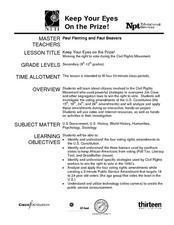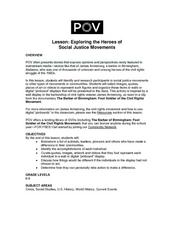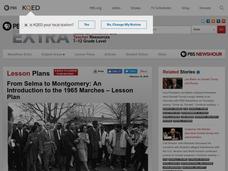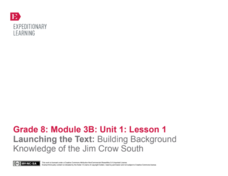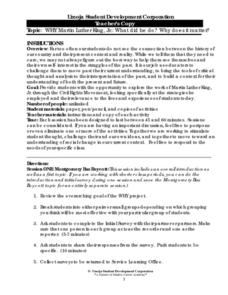Curated OER
Voices from Little Rock: Understanding the Civil Rights Movement through Primary Sources
As part of a study of the Civil Rights Movement, class members examine documents associated with the Little Rock Nine, the Brown v. Board of Education ruling, the 14th and 15th Amendments to the US Constitution, and chapters from Melba...
iCivics
The Road to Civil Rights
Here is a fantastic resource on the civil rights movement! It includes reading materials and worksheets, and particularly highlights major legislation and the role of the judicial branch in the federal government in addressing the...
Curated OER
Keep Your Eye On the Prize
High schoolers learn about citizens who were actively involved in the civil rights movement, and the strategies they used to overcome the Jim Crow laws that were so prevalent in the 1960s. They investigate the voting amendments of the US...
PBS
The Supreme Court: Civil Rights and Civil Liberties
While World War II changed the international order, it also led to a fundamental shift in the concept of civil rights within the United States. Using a video and discussion questions, class members consider the effects the war had to the...
Pacific University Oregon
Civil Rights: US History
To gain an understanding of the Civil Rights Movement of the 1960s, class members investigate the Jim Crow Laws, the Emancipation Proclamation, the 13th, 14th, and 15th Amendments of the US Constitution, and the 1898 Supreme Court case,...
Curated OER
Lesson: Emory Douglas: Revolution in Our Time, Part 2
I love lessons like this because they let kids see the power of art, poetry, and activism in times of social injustice and unrest. They'll analyze the art used by Emory Douglas in the production of the Black Panther newspaper and...
Alabama Department of Archives and History
How Would You Feel? The Bravery of Civil Disobedience
As part of their study of the US Civil Rights Movement and the Montgomery bus boycott, class members read Dr. Martin Luther King's "Integrated Bus Suggestions." They then craft a short story about the first week of Montgomery bus...
Curated OER
Exploring the Heroes of Social Justice Movements
Learners explore social justice, the civil rights movement, and everyday heroes. They view video clips, learn about James Armstrong: The Barber of Birmingham, and create their own hero wall. They present their walls to the class and...
Center for Civic Education
Citizenship Schools and Civic Education During the Civil Rights Movement and in the Present
Your young historians will discover the importance that citizenship education has played in the social progress of the United States as they learn about early efforts to discourage African Americans from voting in the 1960s.
PBS
From Selma to Montgomery: An Introduction to the 1965 Marches
The 1965 Civil Rights marches from Selma to Montgomery and the resulting Voting Rights Act of 1965 are the focus of a social studies lesson. The resource uses film clips to inform viewers not only about the discrimination that gave rise...
K20 LEARN
The Bank Of Justice: Civil Rights In The US
To launch a study of racial segregation and integration, young historians first watch a news video about a prom in Georgia that was first integrated in 2013. They then compare the goals in Lincoln's Gettysburg Address to King's "I Have a...
Curated OER
Mississippi Trial, 1955: K-W-H-L Strategy
To prepare for a reading of Christopher E. Crowe's Mississippi Trial, 1955, class members create a KWHL chart and begin by generating questions they have about the civil rights movement, slavery, and the death of Emmett Till.
Defining US
Integration of Education and American Society
How did the struggle for Civil Rights during the 1950s transform American society and politics? Why are American schools integrated today? Class members explore these essential questions by examining a series of primary and secondary...
Stanford University
Lesson Plan: Montgomery Bus Boycott
Most of us have heard of Rosa Parks, the Montgomery Bus Boycott, and Martin Luther King, Jr. But what about Claudette Colvin, Virginia Durr, Freedom Summer, or the Birmingham Children's Crusade? A five-lesson unit prompts class members...
PBS
The Meaning of the Fourteenth Amendment
The Fourteenth Amendment was extremely important to civil rights and is a crucial one to remember. The resource teaches about the Supreme Court decisions related to the amendment through writing exercises, reading, and working in small...
PBS
Jackie Robinson's Complicated — and Important — Legacy
Americans tend to lock their heroes in history, holding these icons to a particular event or time. Jackie Robinson is such a hero, remembered by most for becoming the first African American to play in the Major Leagues. Young historians...
EngageNY
Launching the Text: Building Background Knowledge of the Jim Crow South
Pictures and photographs help build background knowledge about a topic. Scholars participate in a gallery walk to learn more about the Jim Crow era of US history and the desegregation of schools following Brown v. Board of Education....
Umoja Student Development Corporation
Martin Luther King, Jr.: What Did He Do? Why Does It Matter?
Young historians examine the work of Martin Luther King Jr. by reading and answering questions about the Montgomery Bus Boycott, the Albany Movement, the Birmingham and Chicago campaigns, and the Memphis Sanitation Worker's Strike.
Curated OER
Lesson: Emory Douglas: Art and Activism
Visual literacy can be experienced in many different ways. Learners discuss the times, graphic art, and cultural significance of activism in art as they explore artist and Black Panther, Emory Douglas. This is a discussion-based...
US House of Representatives
Keeping the Faith: African Americans Return to Congress, 1929–1970
New ReviewThe third lesson in a unit that traces the history of African Americans serving in the US Congress examines the period from 1929 through 1970. After reading a contextual essay that details the few African Americans elected to Congress...
US House of Representatives
Permanent Interests: The Expansion, Organization, and Rising Influence of African Americans in Congress, 1971–2007
New ReviewThe fourth installment of the seven-instructional activity unit focused on African Americans elected to and serving in the US Congress looks at the period from 1971 through 2007. Class members read a contextual essay that provides...
John F. Kennedy Presidential Library & Museum
Analyzing the Inaugural Address
Get high school historians to step outside their own shoes by responding to JFK's inaugural address from the perspective of a civil rights activist, a soviet diplomat, or a Cuban exile. After a class discussion about the address, the...
Mississippi Whole School Initiative
Dream Big...With Your Eyes Wide Open
For many people, Barack Obama's presidency was the next step in Martin Luther King, Jr's dream of America's future. Explore the dreams of Americans past and present, as well as the young Americans in your class, with a set of activities...
Library of Virginia
Antebellum Freedom
From indentured servitude to involuntary race-based servitude, slavery has taken many forms in American history. Class members examine three manumission petitions that reveal how the rights of African Americans and African American...




